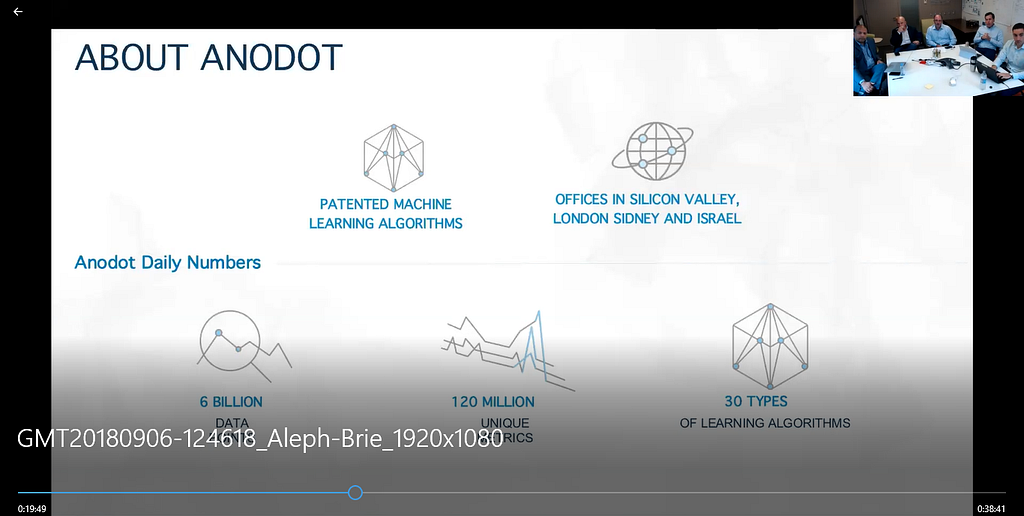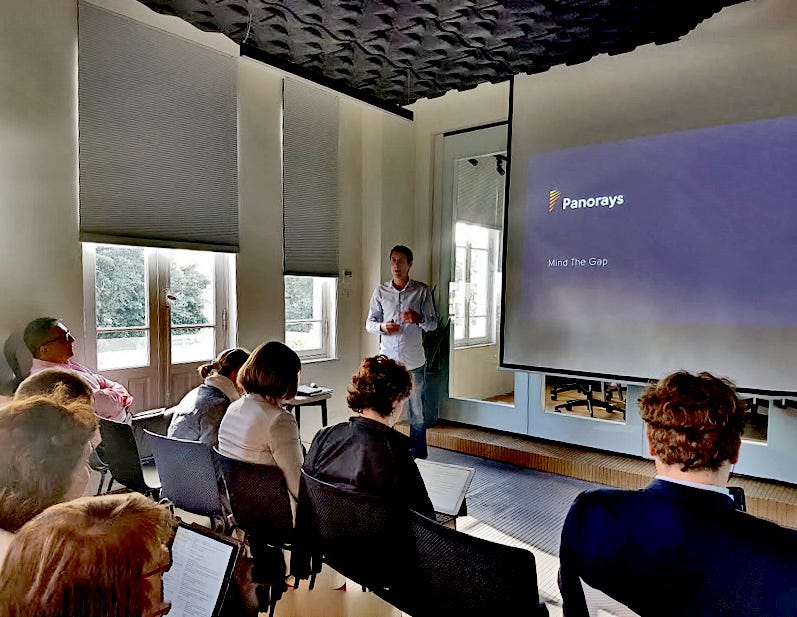Beyond Innovation Tourism

How we create commercial collaborations between Israeli startups and multinational corporations

Last summer I had a call with the corporate development manager of a top New York venture capital fund. He told me that one of their most successful ongoing initiatives were periodic demo days for Fortune 500 executives, showcasing portfolio companies based on pre-mapped use cases. Aleph’s headquarters might be in Tel Aviv, but we are invested in companies targeting international markets, so the first question that came to my mind after that call was — how can we do this remotely? How can we do this from Israel, with the unique opportunities and challenges innate to our location, and how can we utilize Aleph’s unique assets?
Fast forward to a year later, and the VP Strategy, VP Insights and Analytics and SVP Commercial Systems of a major U.S. retail company were seated in an Illinois conference room, connected on Zoom with Sparkbeyond, Anodot, GamEffective, Gong.io and Glassbox, all of which are growth-stage Israel-based startups. Three of these companies are in our portfolio, but all were on the call to discuss potential commercial collaborations. This was the fifth Virtual Briefing Session we held this year — a direct result of the phone call described above and the thought process it initiated. More on that below, but first, some context.

At Aleph, after we invest in a company, we try to be as helpful as possible and assist with hiring, branding and storytelling, acquiring new customers, and when the time comes, finding the right investors for a follow-on round. We do all of this by leveraging our own network and by facilitating a community of executives in our portfolio.
As a VC, our primary goal is to invest in the best companies. Since the inception of Aleph, we have used automation to source startups for deal flow purposes, which results in coverage of 98% of active Israeli startups. But last year, we started using this coverage for a completely different purpose. We now combine this “startup mapping” with our network of multinationals in order to create commercial collaborations. Specifically, we started servicing multinationals by introducing the right stakeholders to the most relevant startups for them, regardless of whether or not we are invested in these startups. The idea is that we can help not only our portfolio companies to grow, but also other startups across the ecosystem. The multinational gains a competitive advantage by gaining access to startup innovation, while the startup acquires a new customer.
More than 200 such commercial introductions later, we have learned many lessons, and in the hope of expanding this network and starting a conversation with ecosystem players dealing with similar challenges, we are sharing them with you:
Finding our Focus
As anyone involved in the Israeli startup universe knows, during the last five years, there’s been a growing airtrain of international business entities and delegations wanting to touch the magic of the startup nation. Some want to invest directly, others want to become LPs, a few open a local branch, others partner with existing local players. There are numerous connectors, such as Startup Nation Central and the Israeli Export Institute, which both do a wonderful job hosting these entities and showing them the potential of the Israeli startup ecosystem.
Every week, we receive inbound requests from multinationals that are planning a visit to Israel and are interested in hearing Aleph’s perspective of the ecosystem. At first, we would host nearly all of them. This didn’t work out so well. Often we found ourselves wondering whether we had actually provided any real value. Other times we were disappointed that there weren’t any follow-up steps or actual outcomes.
So over the past year, our main challenge was identifying and focusing on opportunities to bring real value, both to multinationals and to local startups. This resulted in developing a playbook. Every time we receive an inbound request from a multinational planning a visit to Israel, the first step is understanding the purpose of the trip. Only based on that can we decide whether we are the best fit to host them, and ensure we will make good use of everyone’s time.
Sometimes they themselves (or the person arranging the visit for them) aren’t clear about the purpose of the trip. In other cases, they are looking to get a first, general glimpse into Israeli innovation. If this is the case, we are happy to connect them with other local players who do “innovation tourism” and can provide the desired broad overview. Due to our position in the ecosystem (and through continuous trial and error), we have become quite efficient at matching startups to corporates for the purpose of commercial collaborations, based on areas of focus, use cases and the goals of the visitors. This is what we are now concentrating on.
The Session Itself
A few weeks after the original phone call with the New York VC, a leading U.S. insurance company cancelled a planned visit due to logistical reasons. They were supposed to meet several startups at Aleph, and we wanted to make sure the introductions would be made regardless of the cancellation, in a format that would allow us to maximize the potential mutual value. This accelerated our thought process and resulted in what we now call Virtual Briefing Sessions (suggestions for catchier names are most welcome!).
Here in Israel, we have the unique challenge of being physically remote from the markets, so we created a framework that is better than needing to fly everyone over, and wait for face-to-face availabilities.
The format is lightweight: a one-hour video session, in which several companies present a very targeted pitch to the direct stakeholders of one business unit in a multinational corporation. This is a great use of time for them, because they can see a number of companies in one hour and proceed to a second meeting only with those they deem most relevant. In order to do this successfully, we have to first understand in depth the specific problems a business is trying to solve, and then make sure all the stakeholders — everyone whose KPI could be positively affected by engaging with these startups — will be present in the session. In cases where we failed to bring the direct stakeholders to the session, it just didn’t work.
Another crucial factor is, of course, finding the right startups. As the multinational is our primary “client” in these interactions, we want to service them in the best possible way by suggesting the most suitable startups, regardless of who’s in our portfolio. So in all these sessions, we always include non-portfolio companies as well. We’ve had 18 such companies that have participated in five Virtual Briefing Sessions over the past year, chosen out of ~70 we suggested to the corporations. These startups had the opportunity to connect with a top financial services firm, one of the largest food manufacturing companies, a major U.S. retailer and the insurance company mentioned above, whose cancellation pushed this initiative forward.
We didn’t invent this format — VCs in the U.S. have been doing it for a while — but we are quite different in including non-portfolio companies in every one of the sessions we hold. We truly believe that by presenting a corporation with the right startups, even if there’s no immediate value to our portfolio companies, we will establish the most valuable relationships for the long term. And venture capital, as you know, is a long-term business.

Measuring Impact
So we present a startup to a corporate, either face to face while hosting them at Aleph or remotely via a Virtual Briefing Session. What’s the next step? To make sure there are next steps, we need to go backwards, to the stage of setting expectations. During the initial call with the corporate’s point of contact, we very clearly explain the one and only thing we expect in return for facilitating these connections: feedback on all the startups they meet through us. We also set a timeline for how and when this feedback will be provided, and let them know that we will share this feedback with the startups for learning purposes.
We strive to be involved in the follow-up, to make sure that if indeed there’s interest to proceed, nothing slips through the cracks. Sadly, this often happens, especially when C-level executives visit Israel and then try to pass the newly formed and very fragile relationship with the startup to one of their team members. Recently, when following up with a corporate, we understood its email domain was blocking the domain of one of the startups they had met, so even though both parties wanted to follow up, this almost didn’t happen.
Finally, we measure the following metrics: How many of the business introductions facilitated by us progressed to a second meeting? How many resulted with a proof of concept? If a commercial contract was signed, what’s the dollar value? In the past 12 months, our business introductions to portfolio companies yielded contracts totalling over $1.5M, plus continued relationships turning into upsells. While we aren’t sure how impressive this number is (if you are familiar with a relevant benchmark, do let us know), we take pride in knowing what it is.
Scaling Up
While we’ve become quite efficient at leveraging our existing network and implementing a structured process to the interactions described above, there are two main things we are looking to improve:
On a personal note, I was privileged to have the opportunity to take on this role despite no prior experience working in a multinational corporation. While this may be the case for many people holding business roles in startups, frankly I was terrified. The way I see it is, understanding the motivation of the people I work with and the dynamics of where they work is key to creating successful collaborations. Often these are people with very different professional backgrounds, who are measured on specific outcomes I know very little about, working in complex organizations. Not having this personal familiarity with the corporate universe, I knew that I was at a disadvantage. However, I think being aware of that was, and still is, crucial to the ongoing learning process of successfully connecting the dots, and enjoying each and every journey leading to these connections.
Beyond Innovation Tourism was originally published in Aleph on Medium, where people are continuing the conversation by highlighting and responding to this story.
